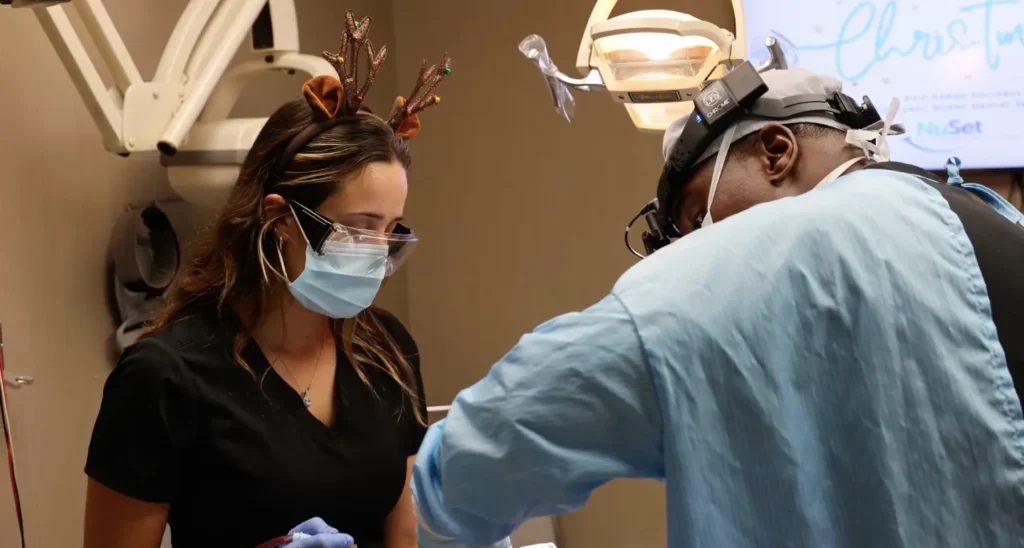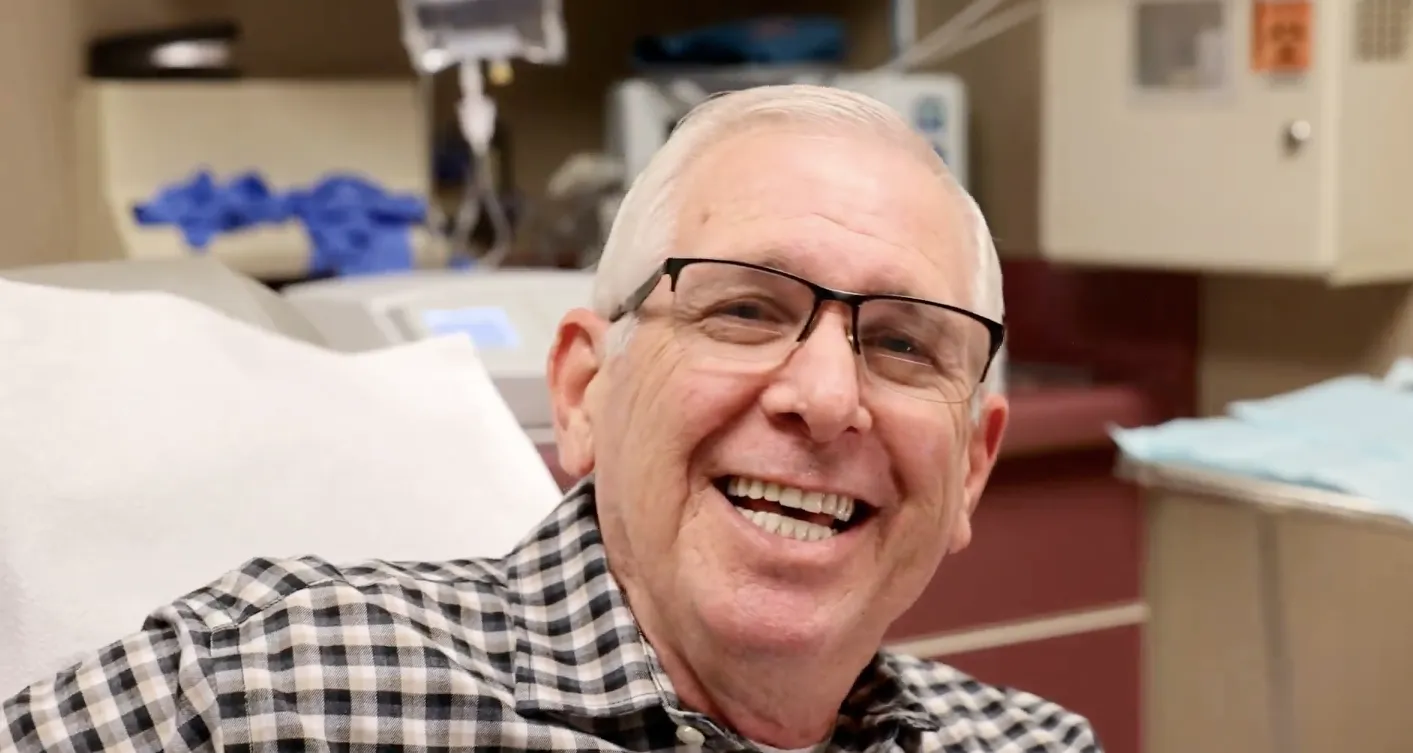Every year, more than 1.5 million Americans receive a cancer diagnosis. This devastating disease can cause various health issues, including muscle weakening, hair loss, brittle bones, bleeding gums, and tooth loss.
Tooth loss can significantly affect both oral and overall health. This is why it’s essential to explore tooth replacement options once cancer treatments are completed.
Cancer patients can get dental implants, but eligibility depends on individual circumstances. Many patients opt for removable dentures, which can be helpful but may also cause issues. The most permanent solution is dental implants. To find the best option, it is crucial to consult a dentist experienced in dental oncology.
Key Takeaways
- Cancer patients may be eligible for dental implants, depending on factors like treatment stage and overall health.
- Chemotherapy and radiation can affect oral health and may complicate implant procedures.
- Consulting both oncologists and dental implant specialists is crucial to assess the feasibility of dental implants.
- Dental implants can improve chewing, speaking, and appearance while preventing bone loss.
- Maintaining good oral hygiene is essential for successful implant integration and overall oral health.
Understanding the Relationship Between Cancer and Dental Implants
Cancer treatments like chemotherapy and radiation can significantly impact oral health. Chemotherapy can weaken the immune system, making it harder for the mouth to heal from infections and wounds. Radiation, especially when directed at the head and neck, can damage the tissues in the mouth, leading to dry mouth, sores, and difficulty healing.
These effects can complicate the process of getting dental implants. However, advancements in dental technology have made it possible for some cancer patients to receive dental implants successfully. New techniques and materials help improve the chances of successful implantation, even for those who have undergone intense cancer treatments.
Factors Influencing the Eligibility of Cancer Patients for Dental Implants
Several factors determine whether cancer patients can get dental implants. These factors include the type of cancer, the stage of treatment, overall health, and the strength of the immune system.
Type of cancer
The type of cancer and its location can affect eligibility. For example, head and neck cancers may have a more direct impact on oral health compared to other types of cancer.
Treatment stage
Patients currently undergoing chemotherapy or radiation may need to wait until their treatments are complete and their health is stable before considering dental implants. Healing and recovery from these treatments are crucial for successful implantation.
Overall health
General health is a significant factor. Patients need to be in good overall health to withstand the surgical procedure involved in placing dental implants. Conditions like diabetes or heart disease can also influence eligibility.
Immune system strength
A strong immune system is essential for healing after implant surgery. Cancer treatments can weaken the immune system, making it harder for the body to recover from surgery and fight off infections.
Collaboration between oncologists and dentists is critical in assessing the feasibility of dental implants for cancer patients. Oncologists can provide detailed information about the patient’s cancer treatment and overall health, while dentists can evaluate the condition of the mouth and determine the best approach for dental implants. This team approach ensures that all aspects of the patient’s health are considered in the decision-making process.
Benefits and Risks of Dental Implants for Cancer Patients
Dental implants can offer significant advantages for cancer patients who have lost teeth due to their illness or treatment. However, there are also potential risks to consider. Understanding both the benefits and the risks can help patients make informed decisions about their dental care.
Benefits of dental implants
- Dental implants provide a permanent solution for tooth loss.
- Implants help restore normal chewing and speaking abilities, which can significantly enhance the quality of life for cancer patients.
- Dental implants look and feel like natural teeth, improving the appearance and boosting confidence.
- Implants can help prevent bone loss in the jaw, which often occurs when teeth are missing. This maintains the structure of the jawbone and facial features.
Risks of dental implants
- Cancer treatments can affect the body’s ability to heal, making it more difficult for the implant to integrate with the jawbone. This can lead to implant failure.
- A weakened immune system due to cancer treatments can increase the risk of infection during and after the implant procedure.
- Chemotherapy and radiation can cause side effects like dry mouth and reduced blood supply to the bones, which can complicate the implant process.
- Some patients may require additional procedures, such as bone grafts, to provide a stable foundation for the implants. These extra surgeries can pose more risks and extend the recovery period.
Patients need to weigh these benefits and risks with their healthcare team. When you consult with us at Nuset, we will work with your oncologist to ensure that the decision to proceed with dental implants is well-informed. Your overall well-being is our utmost priority.
Maintenance Strategies for Oral Health in Cancer Patients
Maintaining good oral health is crucial for cancer patients, especially those considering dental implants. Proper care can help manage the side effects of cancer treatments and support overall health. Here are some tips for maintaining oral health:
- Visit us regularly for check-ups and cleanings.
- Brush your teeth at least twice a day with a soft-bristled toothbrush and fluoride toothpaste.
- Floss daily to remove food particles and plaque between teeth.
- Drink plenty of water to keep your mouth moist.
- Use an alcohol-free mouth rinse to help clean your mouth and reduce the risk of infection.
- Avoid tobacco and alcohol, as they can irritate the mouth and slow healing.
- Eat a balanced diet rich in fruits, vegetables, and whole grains.
- Avoid sugary and acidic foods that can damage your teeth and gums.
Maintaining good oral health is a team effort. Regular communication with us and your oncologist ensures that you are following the best practices for your specific situation. This collaboration helps keep your mouth healthy and supports the success of dental implants.

Choose Nuset Dental Implants and Oral Surgery for Expert Care
Deciding on dental implants as a cancer patient requires careful evaluation. At Nuset Dental Implants and Oral Surgery, we understand the complexities and are committed to providing expert care.
If you are a cancer patient considering dental implants, schedule a consultation with us. Our team of specialists is here to help you make the best decision for your oral health needs. Contact us today to start your journey towards a healthier smile.
Frequently Asked Questions
Can cancer patients receive dental implants?
Yes, cancer patients can receive dental implants, but their eligibility depends on various factors such as the type of cancer, treatment stage, overall health, and immune system strength. Consultation with both an oncologist and a dentist experienced in dental oncology is essential.
How does cancer treatment affect dental implant success?
Cancer treatments like chemotherapy and radiation can impact oral health, potentially complicating the dental implant process. These treatments can weaken the immune system, affect healing, and cause side effects like dry mouth and reduced blood supply to the bones, all of which can influence implant success.
Are there any risks associated with dental implants for cancer patients?
Yes, there are risks, including healing complications, increased infection risk due to a weakened immune system, side effects from cancer treatments, and the potential need for additional surgeries. These risks must be carefully evaluated with your healthcare team.
When is the best time for a cancer patient to get dental implants?
The best time for a cancer patient to get dental implants is typically after completing cancer treatments and once their health is stable. It is crucial to work with both your oncologist and dentist to determine the optimal timing based on your individual health and treatment history.





